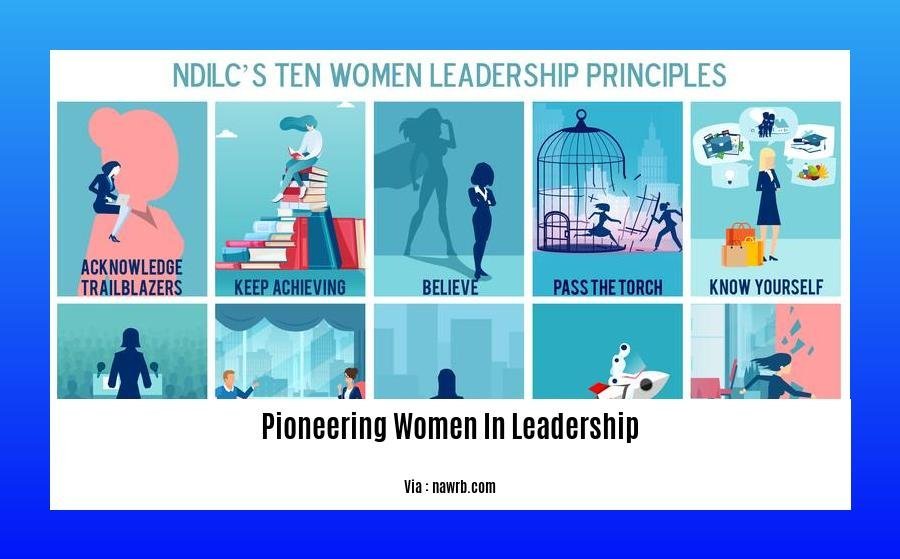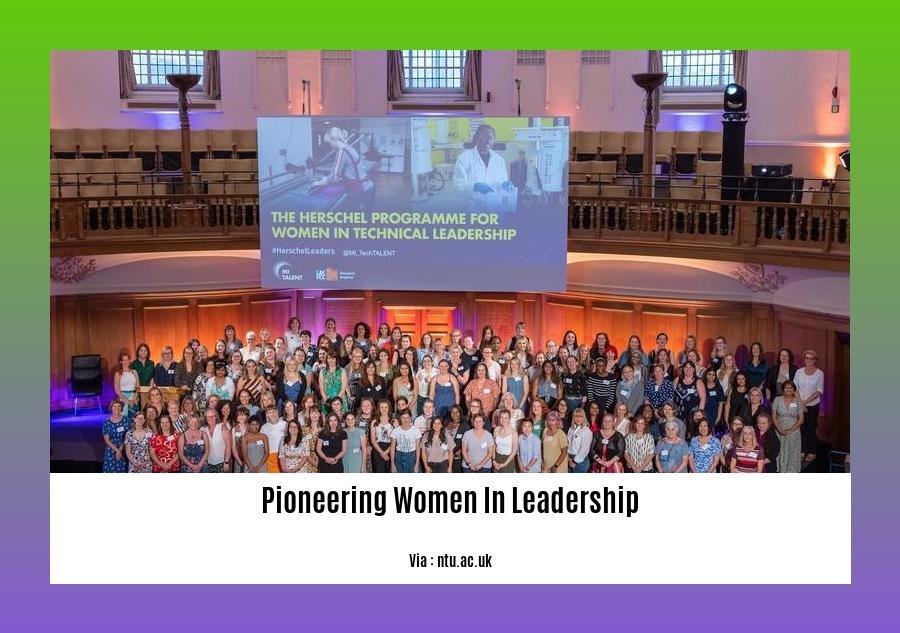Pioneering Women in Leadership: Shattering Barriers and Shaping History: In the annals of leadership, women have blazed trails, shattered barriers, and indelibly shaped the course of history. Their unwavering determination and ability to navigate challenges have propelled them to the forefront of various industries, where they continue to inspire and motivate others. This article delves into the remarkable journeys of these pioneering women, exploring the challenges they faced, the strategies they employed, and the legacy they leave behind.
Key Takeaways:

- Women are making progress in leadership roles across industries.
- Barriers and challenges remain, including bias and limited opportunities.
- Women leaders often possess qualities like empathy, collaboration, and resilience.
- Case studies of successful female leaders offer inspiration and guidance.
- Businesses can support women’s leadership through mentoring, training, and flexible work arrangements.
- Women-led professional organizations foster leadership development and career advancement.
- Women innovators contribute significantly in fields like agriculture, education, and healthcare.
- Female leaders enhance organizational trust and break stereotypes by holding high-level positions.
Pioneering Women in Leadership
Women have made remarkable strides in the realm of leadership, breaking down boundaries and reshaping the landscape of various industries. The rise of pioneering women in leadership has not only paved the way for others but has also brought about a shift in perspectives, challenging traditional stereotypes.
Inspiring Cases of Leadership
The impact of pioneering women in leadership is undeniable. Throughout history, women like Marie Curie and Rosa Parks have left an enduring mark on science and human rights. In the business world, Sheryl Sandberg and Indra Nooyi are shining examples of leaders who have shattered glass ceilings. These women have not just achieved success but have also inspired countless others to believe in their potential.
Qualities of Successful Women Leaders
What sets pioneering women in leadership apart? Research has identified specific qualities that contribute to their success. These include:
- Empathy and Emotional Intelligence: Women leaders often exhibit a strong ability to connect with others, understand their perspectives, and foster collaboration.
- Resilience and Adaptability: They possess the mental fortitude to navigate challenges, adapt to changing circumstances, and bounce back from setbacks.
- Authenticity and Humility: These leaders lead with integrity and authenticity, embracing their unique strengths and acknowledging areas for growth.
Impact on Organizations
The presence of pioneering women in leadership has far-reaching implications for organizations. By being visible and serving as role models, they:
- Enhance Trust and Credibility: Women in high-level positions can boost organizational trust and challenge stereotypes associated with leadership.
- Drive Innovation and Diversity: They bring fresh perspectives, fostering an inclusive and innovative culture that benefits the entire team.
- Empower and Mentor Others: Successful women leaders often mentor and support emerging leaders, creating a pipeline of talent and encouraging diversity in leadership.
Supporting Women’s Leadership
Creating an environment that supports and elevates pioneering women in leadership is crucial. Here are some steps businesses can take:
- Bias Reduction and Inclusion Training: Implement training programs that address unconscious bias and promote inclusive practices.
- Mentoring and Sponsorship Programs: Establish formal mentoring and sponsorship programs that connect women with experienced leaders.
- Flexible Work Arrangements: Offer flexible work arrangements that accommodate the needs of women with family responsibilities.
Conclusion
The rise of pioneering women in leadership is a testament to the power of human potential, shattering barriers and reshaping the world we live in. Their leadership and successes inspire us all to challenge norms, embrace diversity, and strive for a more equitable and inclusive society.
Throughout history, women have faced significant barriers in politics. However, many have shattered these obstacles and become trailblazing female heads of state and influential women who shattered political barriers. These leaders broke glass ceilings and paved the way for future generations of female politicians. Explore the inspiring stories of these women who have made a lasting impact on the world famous female political leaders who broke glass ceilings.
Strategies for Empowering Women in Leadership
Across industries, women’s leadership is crucial for driving innovation, fostering diverse perspectives, and creating inclusive workplaces. Here are some essential strategies to empower women in leadership roles:
Implement Diversity and Inclusion Initiatives: Establishing policies and programs that promote diversity in hiring, promotion, and retention fosters a more inclusive environment for women.
Provide Training and Education on Unconscious Bias: Train employees to recognize and mitigate unconscious biases that may hinder women’s advancement.
Offer Mentorship and Sponsorship Programs: Pair women with experienced leaders who can provide guidance, support, and sponsorship opportunities.
Ensure Pay Equity and Fairness: Regularly review and adjust compensation structures to eliminate pay gaps based on gender. Promote transparent and fair practices in performance evaluations and advancement opportunities.
Encourage Male Allies: Engage male colleagues as allies to support gender diversity and women’s empowerment. Their advocacy and support can create a more inclusive and equitable work environment.
Key Takeaways:
- Empowering women in leadership drives innovation, improves workplace culture, and enhances decision-making.
- Implementing diversity initiatives, providing training, and offering mentorship programs are crucial for women’s success.
- Pay equity, fairness in promotion, and encouraging male allies are essential for creating a supportive environment.
Source:
Women’s Empowerment in Leadership: Equality in the Workplace
Role models of successful women leaders
When we think of successful leaders, images of men often come to mind. However, role models of successful women leaders are just as important. They inspire others, break down barriers, and create opportunities for all.
Women leaders have been shown to enhance productivity, collaboration, and fairness in organizations. Exposure to successful female leaders can positively influence women’s performance and self-evaluation in leadership tasks.
Some of the most inspiring role models of successful women leaders include:
- Indra Nooyi, former CEO of PepsiCo
- Sheryl Sandberg, COO of Facebook
- Ursula Burns, former CEO of Xerox
- Mary Barra, CEO of General Motors
- Ginni Rometty, CEO of IBM
These women have shattered glass ceilings and achieved great success in their respective fields. They are a testament to the power of determination, resilience, and hard work.
Key Takeaways:
- Women leaders can inspire others, break barriers, and create opportunities.
- Female leaders have been shown to enhance productivity, collaboration, and fairness in organizations.
- Exposure to successful female leaders can positively influence women’s performance and self-evaluation in leadership tasks.
Citation:
Forbes: 15 Of The World’s Most Inspiring Female Leaders
The Future of Women in Leadership
Key Takeaways:
– Women leaders foster innovation, enhance productivity, and create a positive work environment.
– Organizations must prioritize identifying and supporting future female leaders.
– The representation of women in leadership roles is growing but remains below that of men.
– Work-life balance, bias, and lack of opportunities pose challenges for women in leadership.
The future of women in leadership is promising, with women increasingly breaking barriers and assuming leadership roles.
Organizations play a critical role in promoting female leadership by:
- Identifying potential leaders early and investing in their development.
- Providing mentorship and support through formal programs.
- Establishing inclusive cultures that minimize bias and promote diversity.
Despite progress, challenges persist:
- Bias: Unconscious prejudices hinder women’s advancement.
- Lack of opportunities: Women face a narrower pool of leadership roles.
- Work-life balance: Balancing career and personal responsibilities can be difficult.
Empowering women in leadership requires addressing these challenges and creating a more level playing field.
Citation:
* Forbes: Data Shows Women Make Better Leaders. Who Cares? [

FAQ
Q1: How have pioneering women in leadership contributed to shaping history?
A1: Pioneering women in leadership have played a pivotal role in shaping history by breaking down barriers, advocating for change, and inspiring future generations. Their contributions span various industries and have led to significant advancements in fields such as politics, business, science, and social justice.
Q2: What are the distinct qualities that characterize pioneering women leaders?
A2: Pioneering women leaders often possess a unique combination of traits that contribute to their success. These qualities include resilience in the face of adversity, a strong sense of empathy, exceptional communication skills, and the ability to collaborate effectively with diverse teams.
Q3: What challenges have pioneering women leaders faced in their careers?
A3: Pioneering women leaders have historically faced numerous challenges in their careers, including bias, discrimination, lack of opportunities, and work-life balance issues. They have had to navigate male-dominated environments and overcome societal expectations.
Q4: How can organizations support and empower pioneering women leaders?
A4: Organizations can support and empower pioneering women leaders by implementing initiatives such as mentorship programs, bias reduction training, and flexible work arrangements. They can also create inclusive workplaces where women are valued and given equal opportunities for advancement.
Q5: What lessons can we learn from the experiences of pioneering women leaders?
A5: The experiences of pioneering women leaders offer valuable lessons for aspiring leaders and society as a whole. They teach us the importance of resilience, perseverance, and collaboration. They also inspire us to challenge stereotypes and work towards a more equitable future.










